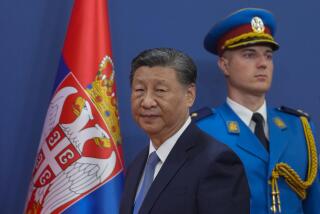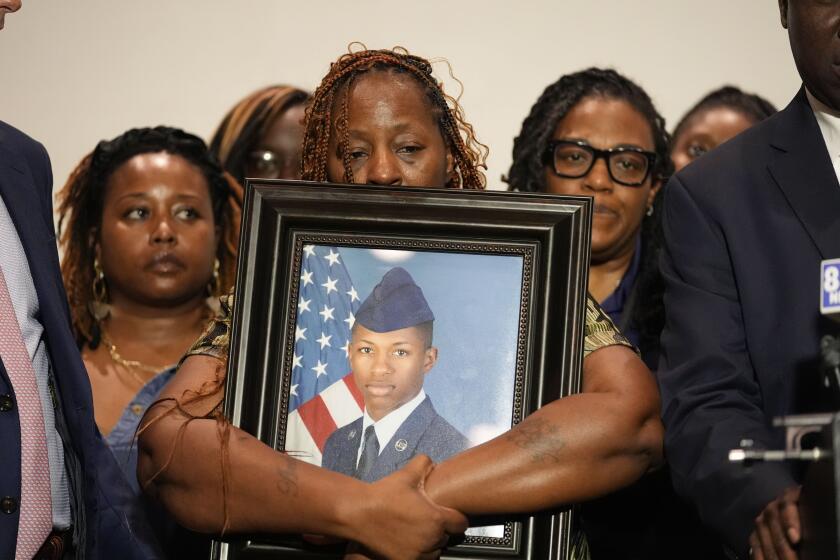Holy Land federal witnesses go uncalled
The Justice Department’s decision not to call additional witnesses in its prosecution of an Islamic charity for alleged ties to terrorism suggests it is resting its case on the strength of contested documents and the testimony of FBI agents and Israeli security officials.
The U.S. District Court trial resumes Tuesday in Dallas with the defense beginning presentation of its evidence.
Over the last six weeks, prosecutors have presented a mountain of financial records seized from offices of the Holy Land Foundation for Relief and Development in the U.S. and zakat charity committees in the West Bank and Gaza.
The records, authorities allege, show that the now-defunct foundation and five of its former officials knowingly sent millions of dollars overseas to support terrorism, not to help the needy.
The prosecution says the money went to organizations under the control of Hamas militants.
The charge has been denied by the defendants, all but one of whom are U.S. citizens.
In addition to hundreds of exhibits, the government took the extraordinary step of allowing two Israeli agents to testify anonymously in a closed courtroom to buttress claims that the zakat committees were widely known as fundraising fronts for Hamas.
The most important testimony to date, in fact, has probably been from an officer of the Shin Bet, Israel’s domestic security agency.
Identified only as Avi, he maintained that Hamas’ financial survival relied on the worldwide fundraising of such organizations as Holy Land.
“This network was formed by design; it wasn’t created out of the blue,” he testified.
In pretrial documents, prosecutors identified more than two dozen other potential witnesses including, most notably, Mohamed Shorbagi, a former Holy Land representative in Georgia who pleaded guilty last year to aiding Hamas; and Abdulrahman M. Alamoudi, a naturalized U.S. citizen and founder of the American Muslim Council, who admitted to participating in a Libyan plot to assassinate the crown prince of Saudi Arabia.
With a gag order in place, prosecutors could not comment about why they did not call the two men as witnesses, and attorneys for the government and the defense could not speculate on what effect that could have on jurors.
But clearly, authorities are betting they will not need the insiders to make their case -- a bet that always carries risk, according to legal experts.
“Sometimes you need an insider to make that critical link between the criminal activity and the knowledge of the defendants” about a crime, said USC law professor Heidi Rummel, a former assistant U.S. attorney.
Loyola law professor Laurie Levenson, also a former federal prosecutor, agreed: “Often you want the insider to explain things and put the whole case together for the jury.”
But Rummel and Levenson stressed that the wrong informant can also do far more damage than good to a case, particularly if jurors conclude that the witness is untrustworthy or only testifying because of a plea bargain.
“As a general matter, most prosecutors prefer a clean case [without the need for] informers who can be somewhat culpable in a crime and carry baggage,” Rummel said.
The government could call the witnesses after the defense presents its case, but only if they are brought in to rebut defense testimony.
So the government may lose the insiders as potential witnesses, Rummel said, if the defense doesn’t present evidence the insiders are qualified to rebut.
According to court documents, defense attorneys expect to call several former U.S. officials to testify that Holy Land officials either had no links to Hamas or could not have known that any money being sent overseas might go to extremists, if it even did.
Edward Abington, former U.S. consul general in Jerusalem, is to testify that it was not contrary to U.S. policies for American charities to work with Palestinian zakat committees, according to defense papers filed before the trial began.
Defense papers also say that Frank R. Anderson, former chief of the CIA’s Near East Division, is to testify that Holy Land’s practice of providing money to Palestinian charities did not constitute “reward” for terrorism, recruitment for Hamas, or recruitment for any terrorist activities -- contrary to the government’s allegations.
And former Rep. John Bryant (D-Texas), Holy Land’s lobbyist for three years, is to testify that the organization, once the nation’s largest Muslim charity, spent years trying unsuccessfully to have the government identify which overseas organizations should not receive funds because of connections to terrorism.
In a 2005 interview with The Times, Bryant said that during his time working with Holy Land, he became convinced “political chicanery” was behind the attacks on the organization.
“I’ve been a lawyer since 1972, and every lawyer has represented a client at one time or another who is not innocent,” Bryant said.
“Well, I studied Holy Land’s operation. I learned the culture. I went to talk to the [government] agencies. And I could never figure out why people were talking about them that way.
“I never, ever heard a conversation that suggested in any way that they had an illegal intention of any kind,” said Bryant. “Their board members were a bunch of old fuddy-duddies. They were bunch of regular folks. I don’t recall any hot-blooded ideologues in sight.”
--
More to Read
Start your day right
Sign up for Essential California for news, features and recommendations from the L.A. Times and beyond in your inbox six days a week.
You may occasionally receive promotional content from the Los Angeles Times.






